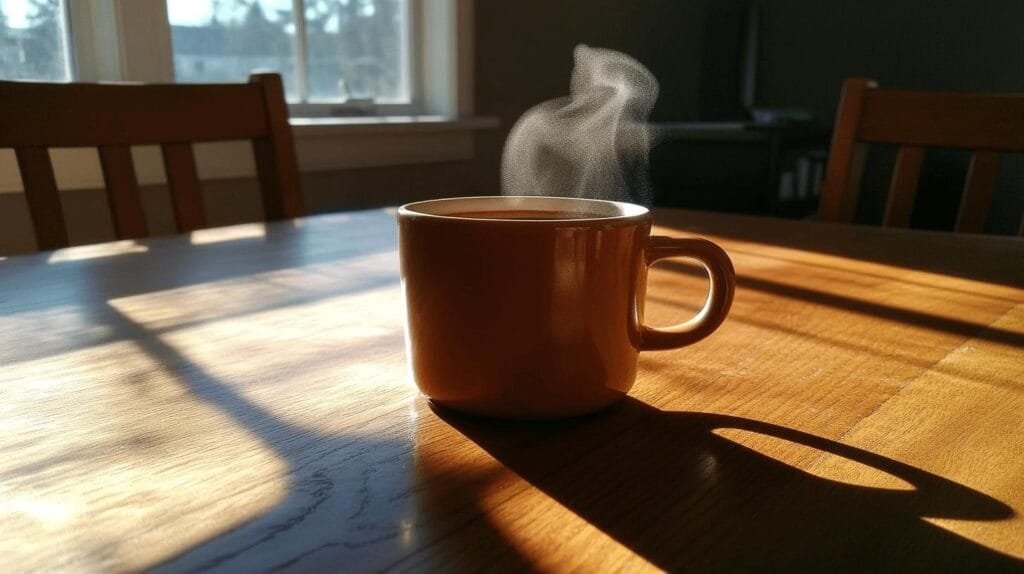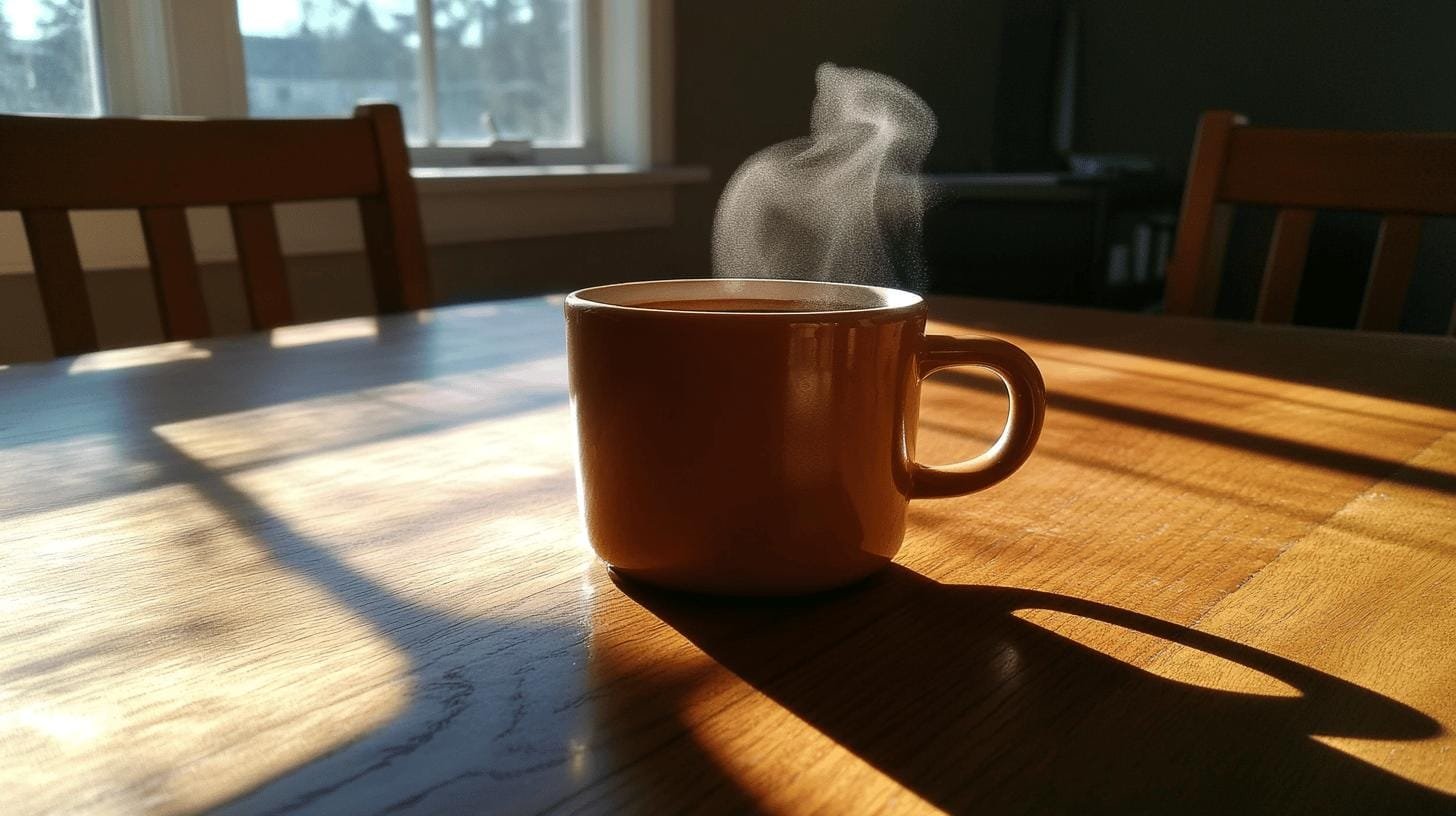
Artisanal Rituals for a Memorable Customer Experience
How can brands create a more balanced and memorable customer experience by blending artisanal product quality with thoughtful everyday rituals that keep people coming back?

How long does decaf coffee last in your body? While it may seem like a simple swap for caffeine-free bliss, decaf coffee still contains a trace amount of caffeine – between 2 to 5 milligrams per 8-ounce cup. This often-overlooked detail raises questions about its duration in the human system.
Understanding the subtlety of decaf’s caffeine content and its effects on the body is essential for those aiming to manage their caffeine intake with precision. Explore the duration and impact of decaf caffeine on your body’s internal clock in our comprehensive guide.

Decaf coffee has minimal caffeine, staying in the body for about 3 to 5 hours. This duration can vary due to different metabolic rates. The half-life of caffeine, or the time for half of it to leave the body, is typically between three and five hours. For example, after drinking decaf with roughly 3 milligrams of caffeine, about 1.5 milligrams will persist after five hours.
Certain factors influence how long caffeine remains in the body. Age and liver health impact caffeine clearance. Older people or those with liver issues may find caffeine lingers longer. Genetics also play a role, as some people have a higher sensitivity to caffeine. Even the small amount in decaf can affect them for several hours, possibly disrupting sleep if consumed in the evening.
To understand how caffeine lasts in the body, compare different sources:
| Caffeine Source | Duration in Body |
| Decaf Coffee | 3 to 5 hours |
| Regular Coffee | 5 to 8 hours |
| Green Tea | 3 to 5 hours |
These variations emphasize individual differences when assessing caffeine’s impact. Even minimal caffeine in decaf can affect sensitive people, especially if consumed late in the day.
The duration of caffeine from decaf coffee varies due to individual metabolism. Age, liver function, and genetics are primary factors. As we age, metabolism slows, affecting caffeine elimination. Liver health also plays a role; impaired liver function may prolong caffeine presence in the system. Genetic differences in enzyme activity can cause some to metabolize caffeine faster or slower.
Beyond age and genetics, other factors influence caffeine clearance. Medications can alter metabolism rates by interacting with metabolic pathways. Individual sensitivity and tolerance also matter; those more sensitive to caffeine might notice effects even from decaf. Conversely, regular caffeine consumers may build a tolerance, feeling milder effects from similar amounts.

Its low caffeine content, about 2 to 5 milligrams per 8-ounce cup, rarely affects sleep for most. However, sensitive individuals might experience disruptions when consumed late. Decaf’s reduced caffeine level is beneficial for those reducing intake but still enjoying coffee’s taste.
Decaf coffee shares health benefits with regular coffee, like antioxidants and possible disease protection. However, it doesn’t provide the same alertness or energy boost, which might be a downside for some. Yet, those sensitive to caffeine might appreciate fewer side effects like jitteriness or increased heart rate.
Decaf coffee is beneficial for those sensitive to caffeine because it generally contains only 2 to 5 milligrams per 8-ounce cup, reducing sleep disturbance and jitters common for such individuals. By choosing decaf, people can savor coffee’s aroma and taste without the intense effects of caffeine.
For those moving towards a caffeine-free lifestyle, decaf is an excellent choice. It allows for gradual caffeine reduction without sacrificing coffee’s sensory experience. It supports participation in social coffee occasions and maintaining rituals without caffeine-related side effects, improving sleep and reducing anxiety for sensitive individuals.
Decaf and regular coffee both offer antioxidants that combat oxidative stress and reduce inflammation. They may lower risks of diseases like type 2 diabetes and neurodegenerative conditions, improve liver health, and decrease cancer risk. Despite reduced caffeine, decaf retains many benefits, making it suitable for those seeking coffee’s health perks without caffeine.
Decaf holds about 2 to 5 milligrams per 8-ounce cup, while regular coffee has about 95 milligrams. This makes decaf less likely to cause side effects like jitteriness or insomnia, benefiting those sensitive to caffeine or reducing intake. Lower caffeine levels also mean decaf is less likely to disrupt sleep, allowing consumption later in the day.
Home-roasting ensures better control, preserving natural flavors and aromas through perfect roasting. This often results in a fresher, tastier cup compared to mass-produced beans. It also allows experimentation with roast levels and bean origins, tailoring to individual preferences. Home-roasted decaf offers superior taste and quality, a characteristic often lost in commercial processes.
Exploring the caffeine content of decaf coffee reveals a significantly lower presence compared to regular coffee, effectively achieved through various decaffeination processes. Understanding how long does decaf coffee last in your system highlights that it typically remains for about 3 to 5 hours, varying by individual metabolic factors like age and liver function. For caffeine-sensitive people, this makes decaf an excellent choice for enjoying coffee while minimizing caffeine intake’s effects on sleep and health. Embracing decaf allows coffee lovers to savor the experience without the full impact of caffeine.
Coffee generally keeps most individuals awake for 3 to 5 hours due to its caffeine content, but this can vary based on personal sensitivity and metabolism.
Caffeine does not usually remain in the system for days, but trace amounts can linger due to individual metabolic rates, though effects are negligible after 24 hours.
Caffeine generally stays in the system for 3 to 7 hours, influenced by factors like age, health, and individual metabolic variability.
Decaf coffee is unlikely to keep individuals up all night due to its minimal caffeine levels, making it a preferred option for evening consumption by caffeine-sensitive persons.
Withdrawal symptoms from decaf coffee are rare but may include minor psychological effects due to habit change, as decaf contains negligible caffeine content.

How can brands create a more balanced and memorable customer experience by blending artisanal product quality with thoughtful everyday rituals that keep people coming back?

Independent coffee shops have always been about more than caffeine—they’re hubs of creativity, connection, and care. As café culture continues to evolve, new trends are

Introduction Independent cafes win when they feel like the neighborhood’s living room and operate with the discipline of a great kitchen. Below is a quick

Discover how top specialty coffee brands create lasting loyalty through storytelling, sourcing, and community connection. Real tips from 6 industry experts.

Discover the ultimate showdown between two beloved coffee brewing methods: the French press and Chemex. Explore how each technique caters to distinct palates, with the French press delivering bold flavors and the Chemex presenting a bright, clean taste.

Unlock the secrets to brewing the perfect cup of coffee with our comprehensive guide on using a coffee scale. Discover how precise measurements enhance flavor and consistency while eliminating bitterness.

Discover how water temperature plays a vital role in brewing the perfect cup of coffee. This article delves into the ideal temperature range of 195°F to 205°F for optimal flavor extraction, enhancing the enjoyment of high-quality beans.

Discover the world of curated specialty coffee bundles, perfect for enthusiasts seeking quality and craftsmanship. This article explores the benefits of ethically sourced, small-batch beans from brands like Equipoise Coffee, offering diverse flavor profiles that elevate your brewing experience.

Discover the art of manual brewing to elevate your coffee experience! This article explores various techniques like pour-over, French press, and AeroPress, revealing how they enhance flavor and your connection to every cup.